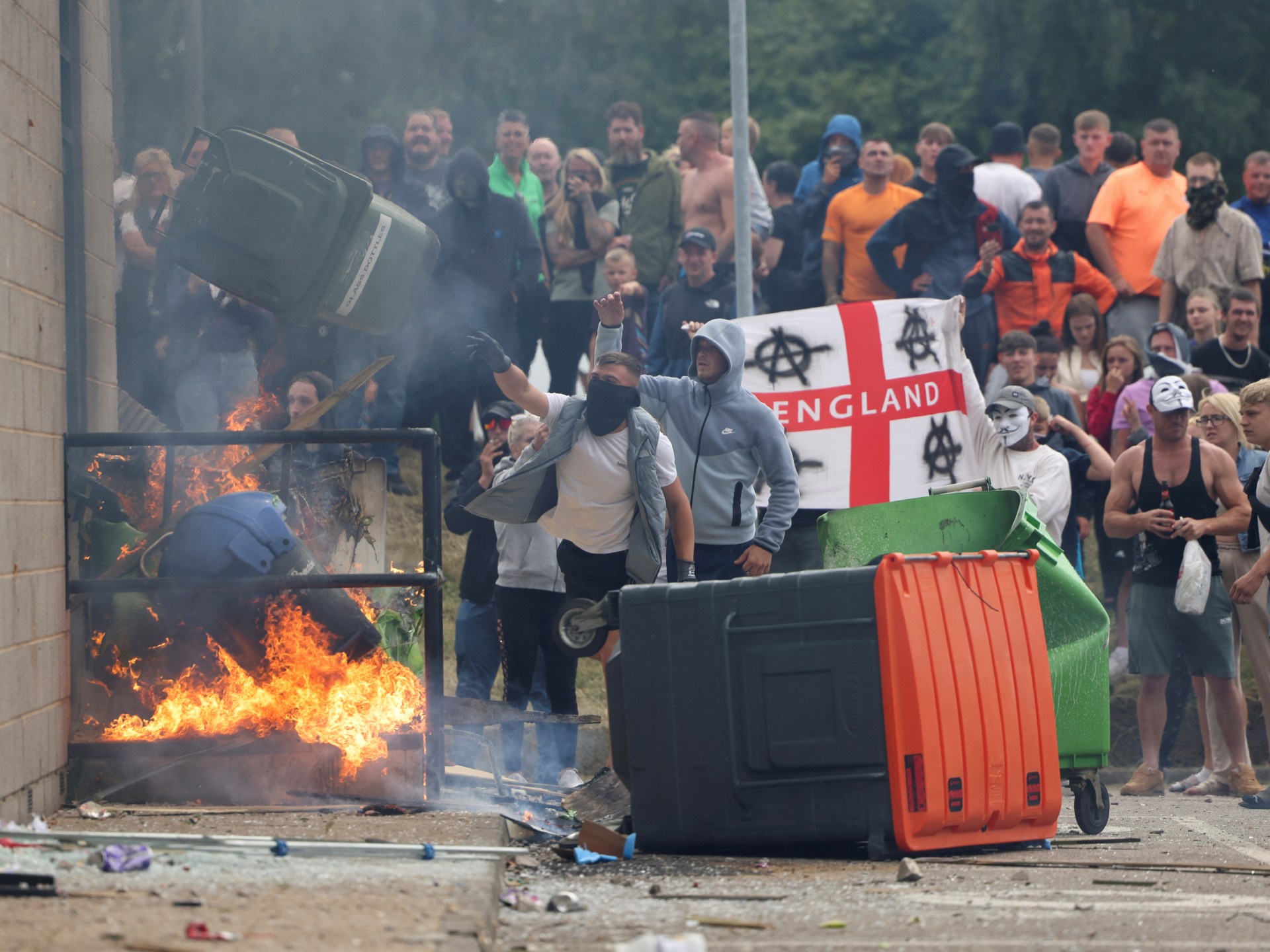It has been a year since the Southport attack, which triggered furious racist riots in the streets of the United Kingdom. Unruly crowds, galvanised by false claims that the perpetrator was Muslim, went on a rampage, attacking mosques, Muslim-owned businesses, homes, and individuals they perceived as Muslim.
As the riots were raging, I was finishing my novel, The Second Coming. The book is set in a dystopian future in which a Christian militia inspired by English nationalism seizes London, bans Islam, and exiles Muslims to refugee camps in Birmingham. The events unfolding in the streets as I was writing the final chapters made me realise that today, we are much closer to the dystopian world in my novel than I had imagined.
The scenes and images that helped me shape this fictional world were inspired by the England I lived in during my youth, when racist violence was rampant. Gangs of white youth would hunt us down, especially after the pubs closed, in wave after wave of what they called “Paki bashing”.
Knife attacks and fire bombings were not uncommon, nor were the demands by far-right groups, such as the National Front and the British National Party, for the repatriation of Black (ie, non-white) “immigrants”.
Attending school sometimes meant running through a gauntlet of racist kids. In the playground, sometimes they swarmed around, chanting racist songs.
As a student, I lost count of the number of times I was physically attacked, at school, in the street, or in pubs and other places. When I lived in East London, I was with the local youth of Brick Lane, where hand-to-hand fighting took place to stop hordes of racist attackers. These assaults were not an isolated phenomenon. Similar scenes took place across the country, with the National Front and British National Party organising hundreds of marches, emboldening white supremacist gangs.
Around this time, some of my peers and I were arrested and charged with “conspiracy to make explosives” for filling up milk bottles with petrol as a way of defending our communities against racist violence; our case came to be known as the Bradford 12. These struggles, whether in Brick Lane or Bradford, were part of a broader fight against systemic racism and far-right ideologies that sought to terrorise and divide us.
The overt, street-level violence of those years was terrifying, but it came from the margins of society. The ruling political class, though complicit, avoided openly aligning with these groups. A case in point is Margaret Thatcher, who in 1978, as the leader of the Conservative Party, gave an infamous interview in which she said, “People are really rather afraid that this country might be rather swamped by people with a different culture.” It was a subtle nod of approval for racist mobs, but as prime minister, Thatcher still kept far-right groups at an arm’s length.
Today, that distance has disappeared. Prime Minister Keir Starmer and other prominent members of Labour regularly echo far-right rhetoric, promising to “crack down” on those seeking sanctuary here. His Conservative predecessor, Rishi Sunak, and his ministers were not different. His Home Minister Suella Braverman falsely claimed grooming gangs had a “predominance” of “British Pakistani males, who hold cultural values totally at odds with British values”.
While the old crude white racism has not disappeared, a more vicious form – Islamophobia – has been fanned over the past few decades. It feels like the old “Paki” bashing gangs have been replaced by a new crusading wave that equates Islam with terrorism; sexual abuse with Pakistanis; asylum seekers with parasitic hordes about to overrun the country.
This is the soil in which the Reform Party has taken root and flourished, in which ever cruder forms of racism are made respectable and electable. When both Labour and the Tories have become havens for a complex web of political corruption, Reform’s simple anti-migrant and Islamophobic tropes are projected as an honest alternative. This has propelled the far-right party to the top of polls, with 30 percent of voters supporting it, compared with 22 percent for Labour and 17 for the Conservatives.
In this environment, it was rather unsurprising that for the anniversary of the riots, the Economist magazine decided to run a poll focusing on race rather than on issues of economic decline, social deprivation and the never-ending austerity to which the working people of this country have been subjected. The survey showed that nearly 50 percent of the population think that multiculturalism is not good for the country, while 73 percent thought more “race riots” will happen soon.
The nurturing of violent racism at home has run parallel with England’s long history of enacting it abroad. The new face of racism is fed on old imperial tropes of savages that need to be tamed and defeated by civilised colonial rule. These racist ideologies, which welded the empire together, have come back home to roost.
They are playing out in the racist violence on the streets and in the state’s repression of Palestine supporters. They are also playing out in the UK’s unwavering political and military support for Israel, even as it bombs hospitals and schools in Gaza and starves children. Empire taught Britain to use racism to dehumanise entire peoples, to justify colonialism, to plunder, to spread war and famine. Genocide is in Britain’s DNA, which explains its present-day collusion with genocidal Israel.
Against this backdrop of racist, imperial violence, people of all colours and religions and none have mobilised. While they may not have stopped the genocide, they have laid bare the hypocritical barefaced lies of the British political elite. Only this sort of solidarity and challenge to racism can stop the dystopic world of my book becoming a reality.
Source: Aljazeera

Leave a Reply